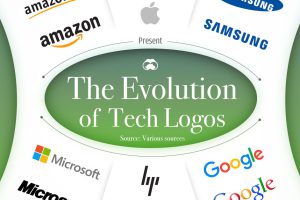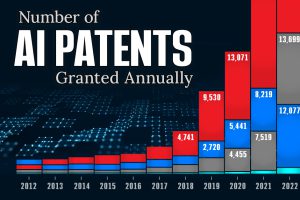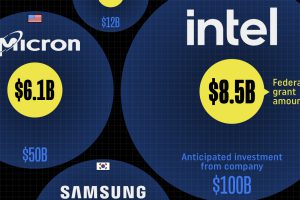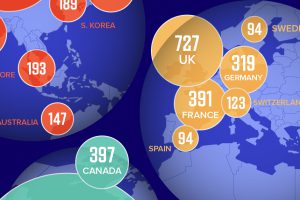Top Companies by Generative AI Patents
This was originally posted on our Voronoi app. Download the app for free on iOS or Android and discover incredible data-driven charts from a variety of trusted sources.
The release of AI assistants like ChatGPT has created significant public enthusiasm for generative AI (GenAI).
Technological advances in GenAI are also reflected in the sharp increase in patent activity. In fact, the number of patent families (group of patents that are all related to the same invention or technology) in GenAI has grown from just 733 in 2014 to more than 14,000 in 2023.
This graphic shows the top companies by patent ownership in GenAI models as of April 2024. The data is from the World Intellectual Property Organization (WIPO), the United Nations agency for innovation and creation.
China Dominates the Patent Race in Generative AI
Among the GenAI programs or models with most patents are:
- Generative Adversarial Networks (GANs): GANs use a generator to create data and a discriminator to evaluate it, refining the generator’s output. They are essential in image generation, style transfer, and data augmentation.
- Variational Autoencoders (VAEs): VAEs encode data into a latent space and decode it back, allowing new data generation by sampling the latent space. They are used in image generation, anomaly detection, and semi-supervised learning.
- Decoder-based Large Language Models (LLMs): LLMs, like GPT, generate text by leveraging the transformer architecture and vast pre-training data. They excel in text completion, translation, summarization, and conversational AI.
China is dominating the patent race for generative AI, with Tencent and Baidu topping the list.
| Company | Country | GenAI Total Patents |
|---|---|---|
| Tencent Holdings | 🇨🇳 China | 2,074 |
| Ping An Insurance | 🇨🇳 China | 1,564 |
| Baidu | 🇨🇳 China | 1,234 |
| IBM | 🇺🇸 US | 601 |
| Alibaba Group | 🇨🇳 China | 571 |
| Samsung Electronics | 🇰🇷 Republic of Korea | 468 |
| Alphabet/Google | 🇺🇸 US | 443 |
| ByteDance | 🇨🇳 China | 418 |
| BBK Electronics | 🇨🇳 China | 377 |
| Microsoft | 🇺🇸 US | 377 |
| Netease | 🇨🇳 China | 337 |
| NTT | 🇯🇵 Japan | 330 |
| Huawei | 🇨🇳 China | 328 |
| China Mobile | 🇨🇳 China | 300 |
| State Grid | 🇨🇳 China | 291 |
| Adobe | 🇺🇸 US | 257 |
| Sony Group | 🇯🇵 Japan | 218 |
| Siemens | 🇩🇪 Germany | 208 |
| Ant Group | 🇨🇳 China | 202 |
| Industrial and Commercial Bank of China | 🇨🇳 China | 191 |
Baidu recently unveiled its latest LLM-based AI chatbot, ERNIE 4.0. Meanwhile, Tencent plans to add GenAI capabilities to its products, such as WeChat, which provides over one billion users with instant messaging, social media, and mobile payment features.
IBM, Alphabet (Google), and Microsoft are the top U.S. companies on the ranking.
IBM has developed a GenAI platform, watsonx, which enables companies to deploy and customize LLMs with a focus on data security and compliance. Alphabet’s AI division recently released its latest LLM model, Gemini, which is gradually being integrated into its products and services. Finally, Microsoft is an investor in OpenAI, the developer of ChatGPT.





